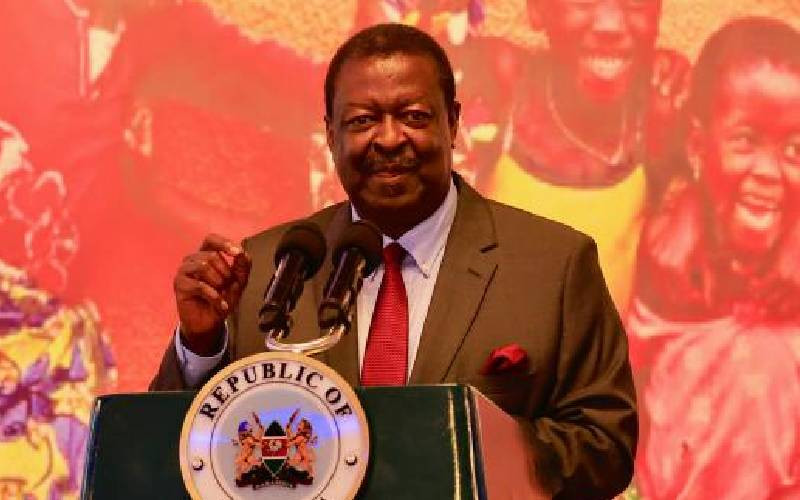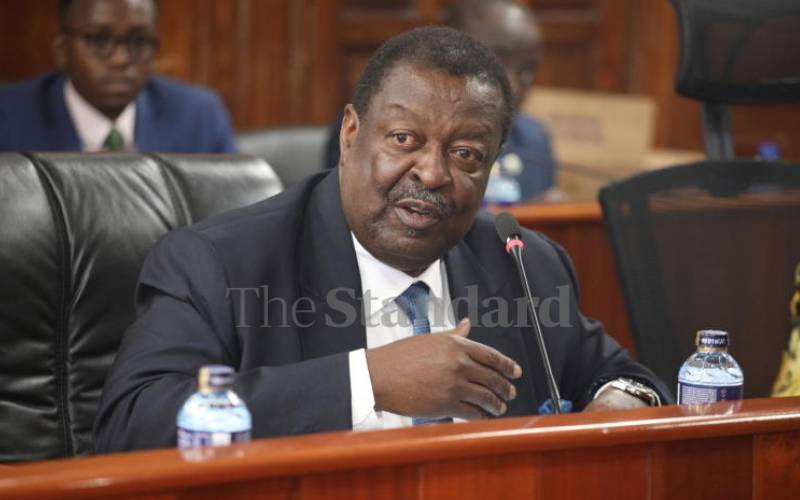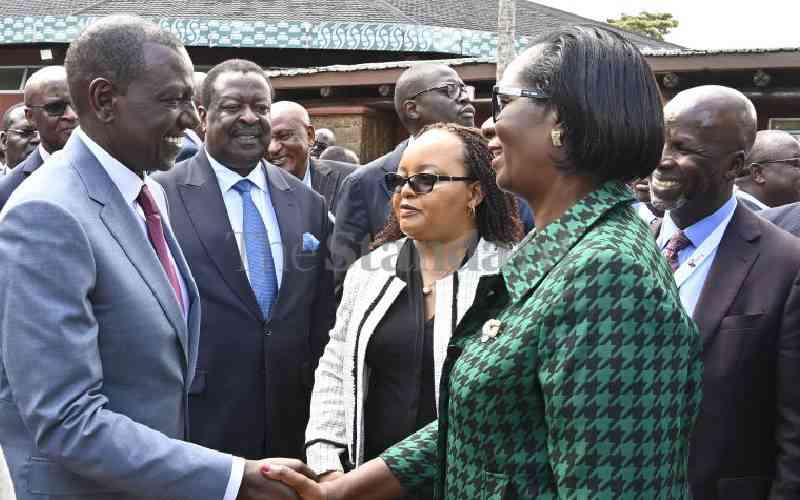
Former Deputy Prime Minister Musalia Mudavadi has asked Kenyans not to judge harshly President Uhuru Kenyatta’s first year in power, noting much of Jubilee’s time has been spent fighting detractions. In an interview with The Standard Reporter Stephen Makabila, Mr Mudavadi said Jubilee has not dealt well with issues of insecurity and corruption in the Government and terror attacks. Here are the excerpts.
Q: What is your assessment of President Uhuru Kenyatta and his Deputy William Ruto one year into office?
ANSWER: They came into office under a spell of doubt, shadow of ICC and were confronted with serious firefighting to remain afloat in a cynical bureaucracy; a cloud of labour unrest, old corruption habits and escalating insecurity. A lot of energy has been expended towards these detractions. These took away their concentration, given theirs was to experiment in the formation of a new administration parallel to implementing a new Constitution. You can imagine what shape you are in when constructing a house on an unstable foundation.
It explains the lingering doubt as to whether the process of forming the Government is now complete or not. Incidentally, that also explains the recent public display of piety when the Cabinet had to explain itself about getting acquainted with their dockets, stock-taking and projections of what they wish to do. Until then, few Kenyans knew how the new constricted Executive worked. Even the President did admit problems with co-ordination by giving the example of the security structure when hosted by Parliament.
The informed conclusion is this is an administration that is still taking shape and the day of judgment is their second year. But like some would say, you can’t experiment forever.
In an ethnically structured society like Kenya, they have sincerely failed to convince on one critical issue – national cohesion, integration and inclusion. A bigger and wider gulf is continuously being created and promoted in the public mind through slanted public appointments. Yet this is really an easy thing since it is a constitutional requirement to balance ethnic, regional and gender representation in public appointments. We seem to be in self-denial on this one.
Q: Have they dealt well with issues of insecurity, corruption in the Government and terror attacks.
A: You heard the President decry, admit and even apportion blame and responsibility on these matters. Identifying the problem is one step, tackling it is another. The latter element is missing. Granted there is effort to capacitate police, there is the nagging issue of co-ordination, which he has raised and seeming inability to push forward police reforms.
The sceptical public is asking: where does the buck stop and where is the courage to confront the problems head-on? Why is the President holding back? Public perception is that there are contagious forces lurking in the background that he needs to confront courageously. But there is a lot that we don’t know given theirs is a coalition setup.
Q: What about fulfilment of their pre-election promises on economic growth, employment creation, and cost of living, among others?
A: These are works in progress and I don’t think it’s fair they be judged basedon one year given the conundrum the new administration found itself in at inception. But they must avoid casting election pledges in stone; vary them and avoid introducing even grander ones.
There is, however, serious lack of capacity in taking a broad view of the economy outside the technical routine. On the spiralling cost of living and what should be done, my advice has been focus on the larger picture of managing the high national debt that consumes almost everything we earn.
Our reliance on taxes stretches cost of goods and reduces disposable incomes. People who can’t spend cannot generate taxes. We are overcommitted on debt and the answer is not more borrowing to invest and hope to pay using the proceeds. We must avoid piling debt upon debt.
Q: What would be your general counsel to them on devolution and general challenges facing the country like the huge wage bill?
Stay informed. Subscribe to our newsletter
A: In our model of devolution, counties are economic incubators. As they grow they add to the national growth kitty. It is therefore imperative that we must banish the mentality that despatching money to counties is a favour; and county governments must also disabuse themselves of the conventional wisdom that money is a donation for advancing populist political projects.
If we had implemented devolution without second-guessing ourselves, we would not be having the current unnecessary debates.
First, devolution has nothing to do with the high wage bill. The only element is duplication of personnel. Deal with that and reduce some wastage. We must sober up and agree to share human resources. But that is only a stop-gap measure; we need to wholesomely confront contentious spending in the budget.
Second, we have absconded the main reason for devolution; that is, to spur economic growth equitably. Devolution is not about how much money you get, but how it should be invested in the counties to create capacity for growth. Even oversight bodies have lost this focus and only advance incessant squabbles.
Q: Do you have any examples of populist political projects?
A: They come in two forms; fantasy photo-shopped ones and the simply incredulous. For instance, I would not waste money trotting the globe looking for investors.
Investors are attracted by basic economic magnets. You don’t even have to be grandiose. Draw up realistic medium, short and long-term integrated development plans as required by law. Then pump resources into improving access to human development – health of country residence, the transport infrastructure, access to clean water, middle-level human resource training, access to affordable agricultural inputs, liberalise the trade regime – and investors will troop in, to set up shop, increase your revenue base and fix unemployment. There is no magic required.
Q: Politically, what have you been doing over the last one year?
A: Reconfiguring the Amani Coalition to make it a relevant and vibrant force in Kenyan politics.
Q: Your UDF party and other Amani coalition partners signed a post-election agreement with Jubilee after the March 4, 2013, General Election. In which way has Amani or UDF benefitted from the ruling coalition?
A: Currently we have a technical committee in place reviewing our relations with Jubilee and depending on the pros and cons, it will make a report on whether to continue engaging or to disengage. Let us give the technical committee a chance to do its work first.
 The Standard Group Plc is a
multi-media organization with investments in media platforms spanning newspaper
print operations, television, radio broadcasting, digital and online services. The
Standard Group is recognized as a leading multi-media house in Kenya with a key
influence in matters of national and international interest.
The Standard Group Plc is a
multi-media organization with investments in media platforms spanning newspaper
print operations, television, radio broadcasting, digital and online services. The
Standard Group is recognized as a leading multi-media house in Kenya with a key
influence in matters of national and international interest.
 The Standard Group Plc is a
multi-media organization with investments in media platforms spanning newspaper
print operations, television, radio broadcasting, digital and online services. The
Standard Group is recognized as a leading multi-media house in Kenya with a key
influence in matters of national and international interest.
The Standard Group Plc is a
multi-media organization with investments in media platforms spanning newspaper
print operations, television, radio broadcasting, digital and online services. The
Standard Group is recognized as a leading multi-media house in Kenya with a key
influence in matters of national and international interest.









